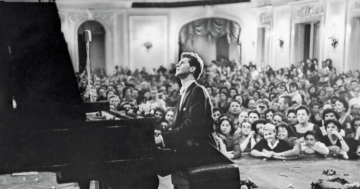Sudip Bose at The American Scholar:
 A new idea, Rosenberg writes, emerged toward the end of the Second World War, that classical music could be so inspirational to a nation that it might help win a war. Thus was Shostakovich’s Seventh Symphony—its first three movements composed in Leningrad as the city was besieged by the Germans—championed in this country as a symbol of freedom and antifascism. The symphony’s artistic merits were less important than its inherent political value, and a national radio audience, hearing the work for the first time on July 19, 1942, was held in a fevered thrall. With the advent of the Cold War and fears growing about the spread of communism, music was increasingly seen to be “interwoven with the democratic aspirations of the American people.” It was, sometimes in not so subtle ways, weaponized. How else to explain the dispatch of symphony orchestras on diplomatic missions abroad? This exporting of American culture to Eastern Europe and the Soviet Union, where artistic freedoms were brutally suppressed, was both a means of promoting democracy and a master stroke of propaganda. And when the pianist Van Cliburn won first prize at the first Tchaikovsky Competition in Moscow in 1958, he was feted with a ticker-tape parade in New York City. His triumph went far beyond the realm of art; Cliburn, the tall, handsome Texan who had melted Russian hearts with Tchaikovsky and Rachmaninoff, had scored one for the West.
A new idea, Rosenberg writes, emerged toward the end of the Second World War, that classical music could be so inspirational to a nation that it might help win a war. Thus was Shostakovich’s Seventh Symphony—its first three movements composed in Leningrad as the city was besieged by the Germans—championed in this country as a symbol of freedom and antifascism. The symphony’s artistic merits were less important than its inherent political value, and a national radio audience, hearing the work for the first time on July 19, 1942, was held in a fevered thrall. With the advent of the Cold War and fears growing about the spread of communism, music was increasingly seen to be “interwoven with the democratic aspirations of the American people.” It was, sometimes in not so subtle ways, weaponized. How else to explain the dispatch of symphony orchestras on diplomatic missions abroad? This exporting of American culture to Eastern Europe and the Soviet Union, where artistic freedoms were brutally suppressed, was both a means of promoting democracy and a master stroke of propaganda. And when the pianist Van Cliburn won first prize at the first Tchaikovsky Competition in Moscow in 1958, he was feted with a ticker-tape parade in New York City. His triumph went far beyond the realm of art; Cliburn, the tall, handsome Texan who had melted Russian hearts with Tchaikovsky and Rachmaninoff, had scored one for the West.
more here.
